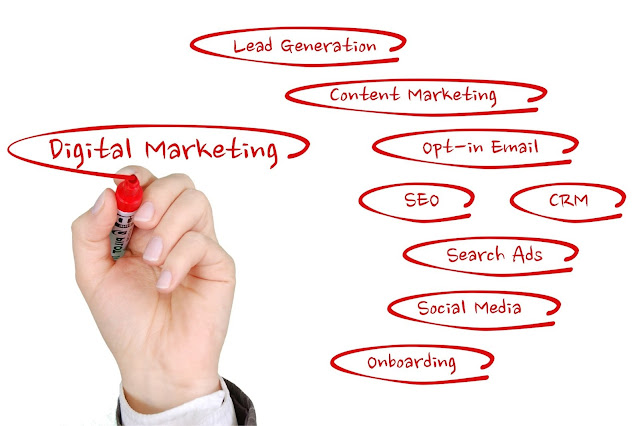How to start Digital Marketing
Digital marketing is a powerful tool that can help businesses reach new customers and grow their online presence. By understanding the basics of digital marketing, setting clear goals and objectives, building a strong online presence, developing a content strategy, utilizing digital advertising, and measuring and analyzing results, businesses can effectively implement a digital marketing strategy and achieve their desired results.
- Defining Digital Marketing: Understanding the basics of digital marketing and its importance in today's business landscape.
- Setting Goals and Objectives: Identifying specific, measurable goals and objectives for your digital marketing strategy.
- Building a Strong Online Presence: Creating a strong online presence through a website, social media, and other digital channels.
- Developing a Content Strategy: Develop a content strategy that resonates with your target audience and drives engagement.
- Utilizing Digital Advertising: Leveraging digital advertising platforms like Google AdWords and Facebook Ads to reach your target audience.
- Measuring and Analyzing Results: Measuring and analyzing the performance of your digital marketing efforts to make data-driven decisions for improvement.
if you don't know what is Digital marketing clickhere
Defining Digital Marketing
Digital marketing is the process of promoting products or services through various digital channels such as the internet, social media, search engines, and mobile apps. It is the practice of reaching out to potential customers and promoting your brand, products, and services through a variety of digital platforms. The goal of digital marketing is to increase brand awareness, drive website traffic, and ultimately, generate more leads and sales.
Digital marketing channels include search engine optimization (SEO), pay-per-click (PPC) advertising, social media marketing, content marketing, email marketing, and mobile marketing. Each of these channels has its own strengths and can be used to reach different audiences and achieve different marketing objectives.
With the rise of technology and the internet, digital marketing has become a vital part of any business's overall marketing strategy. It is an effective way to reach a large and diverse audience, and it is cost-effective compared to traditional marketing methods. With the right approach, digital marketing can help businesses of all sizes to grow and succeed in today's digital world.
In summary, digital marketing is the promotion of products or services through digital channels to reach and engage with target audiences. It plays a crucial role in the business world to increase brand awareness, drive website traffic, and generating more leads and sales. It is cost-effective and versatile which makes it a perfect choice for businesses of all sizes.
if you want to learn types of digital marketing visit this link
Setting Goals and Objectives
Setting goals and objectives is an essential step in creating a successful digital marketing strategy. Without clear goals, it can be difficult to measure the success of your efforts and make data-driven decisions for improvement.
When setting goals and objectives, it's important to make them specific, measurable, attainable, relevant, and time-bound (SMART). This will ensure that your goals are clear, and achievable and have a specific timeline for completion.
Examples of specific and measurable goals for a digital marketing strategy could include:
- Increasing website traffic by 20% within the next quarter
- Generating 50 new leads per month through social media marketing
- Achieving a 10% conversion rate on all PPC advertising campaigns
Once you have set your goals, it's important to develop a plan of action to achieve them. This could involve creating buyer personas, developing a content strategy, or experimenting with different digital advertising platforms.
In summary, setting specific, measurable goals and objectives is crucial for a successful digital marketing strategy. SMART goals will ensure that you have a clear direction, a way to measure success, and a specific timeline to achieve your goals. Identifying your goals and objectives will help you to create a plan of action that will help you to achieve your desired results.
Building a Strong Online Presence
Building a strong online presence is crucial for any business looking to succeed in today's digital landscape. Your online presence is often the first point of contact for potential customers, and it's important to make a good impression.
One of the key elements of building a strong online presence is having a professional website. Your website should be easy to navigate, visually pleasing, and provide valuable information about your products or services. It should also be optimized for search engines, so that potential customers can easily find you when searching for keywords related to your business.
Another important aspect of building a strong online presence is having a strong social media presence. Social media platforms like Facebook, Instagram, and Twitter, allow businesses to connect with potential customers and build relationships. By regularly posting engaging content and engaging with your followers, you can increase brand awareness and drive website traffic.
In summary, building a strong online presence is a crucial step in reaching and engaging with potential customers. A professional website and strong social media presence can help to increase brand awareness, drive website traffic, and ultimately generate more leads and sales. By focusing on these key elements and regularly updating your online presence, you can ensure that your business stays ahead of the competition.
Developing a Content Strategy
Developing a content strategy is an essential step in any digital marketing plan. A solid content strategy can help you to connect with your target audience, build trust and establish your business as a thought leader in your industry.
A content strategy should start with a thorough understanding of your target audience and their needs and interests. Once you have a clear understanding of your audience, you can begin to develop a content plan that resonates with them. Your content plan should include a mix of different types of content such as blog posts, videos, infographics, and social media posts.
It's also important to ensure that your content is optimized for search engines. This can be achieved through the use of keywords, meta descriptions, and alt tags. By optimizing your content for search engines, you can increase your visibility and attract more traffic to your website.
In addition, A good content strategy should also include a plan for content promotion and distribution, such as social media, email marketing, and paid advertising. This will help to increase the visibility and reach of your content and drive more engagement.
In summary, Developing a content strategy is an essential step in any digital marketing plan. By understanding your target audience and creating content that resonates with them, optimizing for search engines, and promoting and distributing your content, you can increase brand awareness, drive website traffic and generate more leads and sales.
Utilizing Digital Advertising
Utilizing digital advertising is a powerful way to reach and engage with your target audience. Digital advertising platforms such as Google AdWords, Facebook Ads, and Instagram Ads allow you to create highly targeted campaigns that can reach specific demographics, interests, and behaviors.
One of the key benefits of digital advertising is its ability to reach a large and diverse audience. You can target specific geographic regions, age groups, and interests, making it an effective way to reach your desired audience.
Another benefit is the ability to track and measure the performance of your advertising campaigns. With the use of tracking pixels and conversion tracking, you can measure the effectiveness of your campaigns and make data-driven decisions for improvement.
When it comes to digital advertising, it's important to have a clear understanding of your goals and objectives. Are you looking to increase brand awareness, generate leads, or drive sales? Once you have a clear understanding of your goals, you can develop a strategy that aligns with them.
In summary, Utilizing digital advertising can be a powerful way to reach and engage with your target audience. It allows you to create highly targeted campaigns and track the performance of your campaigns. By understanding your goals and objectives and creating a strategy that aligns with them, you can effectively use digital advertising to achieve your desired results.
Measuring and Analyzing Results
Measuring and analyzing the results of your digital marketing efforts is crucial for making data-driven decisions and improving the performance of your campaigns. It allows you to understand what's working and what's not, and make adjustments accordingly.
To measure the results of your digital marketing efforts, it's important to set up tracking and measurement tools such as Google Analytics, Facebook Analytics, and conversion tracking. These tools will provide you with valuable data on website traffic, conversions, and the effectiveness of your advertising campaigns.
Once you have collected the data, it's important to analyze it and identify patterns and trends. This will allow you to understand how your audience is interacting with your content and campaigns, and make adjustments to improve performance.
It's also important to review the performance of your competitors and look at industry trends. This will give you a better understanding of the market, and help you to stay ahead of the competition.
In summary, Measuring and analyzing the results of your digital marketing efforts is crucial for making data-driven decisions and improving the performance of your campaigns. Setting up tracking and measurement tools, analyzing the data, identifying patterns and trends, and reviewing the performance of your competitors, will help you to make informed decisions and optimize your campaigns to achieve better results.
conclusion
In conclusion, digital marketing is a powerful tool that can help businesses reach new customers and grow their online presence. By understanding the basics of digital marketing, setting clear goals and objectives, building a strong online presence, developing a content strategy, utilizing digital advertising, and measuring and analyzing results, businesses can effectively implement a digital marketing strategy and achieve their desired results. Each of these steps are interrelated and depend on each other, therefore, it's important to understand them and implement them correctly to achieve the best results. A well-executed digital marketing strategy can help businesses to stay competitive in today's digital landscape, and ultimately, drive growth and success.






0 Comments